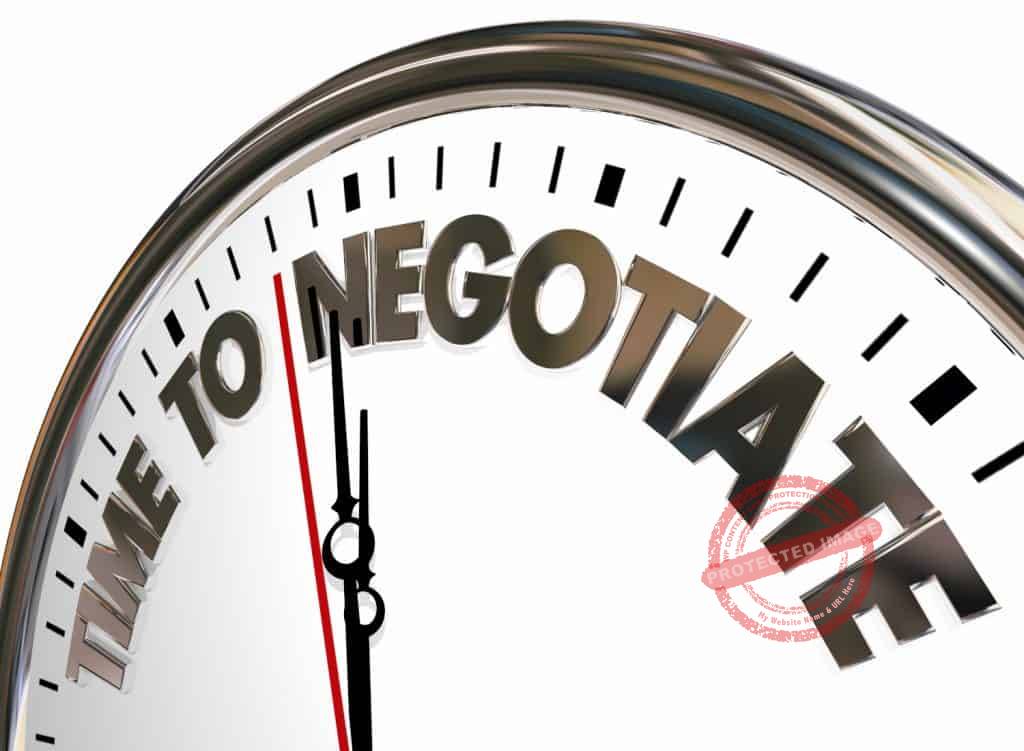Are you curious about how negotiation can save your small business money?
Most successful business owners have great negotiation skills.
Hence, it is vital that you know all about negotiation and how it can save your small business money. Find out all you need to know from this article and start saving money in your business.
Knowing how to save money in business is one of the important skills you need to possess as a business owner.
There are at least two ways to save money on business expenses.
The first one is through cost analysis and management.
In this sense, you determine what your costs are first.
You could be spending too much on production or maybe on office supplies etc.
After identifying them, you either cut them off (i.e. plug the leaks in your cashflow) or reduce them costs.
Sounds easy enough, right?
But there is another way to do it and it is a pretty good way of saving money in business.
It’s called negotiating business deals.
That’s what this article is all about.
So let’s dive right in!
How Negotiation Can Save Your Small Business Money

Business negotiation strategies allow you to save a good deal of money in business.
Well, for example, if you can negotiate a smaller contract price for raw materials then that is a way you are saving money.
Also, when you pay less for your business needs then that will let you earn more.
That alone should emphasize the importance of negotiation in business.
Negotiation techniques can be applied to almost anything.
Sure, you may only get small rebates or discounts from this transaction.
However, if you do it frequently and you negotiate often then you will see all the savings tend to add up.
You end up saving a lot of money on regular and recurring business expenses.
Additionally, you will eventually save thousands all throughout your entire operations.
Now you know some of the ways in which negotiation can save your small business money.
Let’s consider these quick tips on what you should know about the negotiation process.
Knowing How And When To Negotiate

Before you start any negotiation process, you should first learn to spot opportunities to negotiate.
You need to be able to identify where those opportunities are and hypothetically you can negotiate pretty much everything.
Of course, some expense areas and monthly recurring costs like your phone bill, power, may not be open to negotiation.
Nevertheless, there are other ways to reduce costs there too.
You can try talking to the city administrators to have your water bill lowered but don’t count on it to work.
However, you should at least know how to negotiate with a client.
There are certain points of debate where you can nudge things in your favor.
You can talk about important items on the negotiating table.
Examples of which include
- the terms of the deal
- timeline
- delivery terms
- and also the price.
You can at least secure better terms in your favor.
If you can’t negotiate the price at least make sure that the terms will make you operate more efficiently.
That can also help to reduce costs for you.

Now, we already mentioned that there are certain utility expenses that you can’t negotiate your way.
The power bill and water bill can’t be negotiated.
This is because these utility bills usually have statutory fixed rates or prices.
Hence, there’s nothing much that you can do about it.
However, there are rates for recurring expenses that you can bring down.
For instance, if your business has been a valuable customer to your internet service provider, then you can negotiate for an extended long term contract.
Sometimes they will give you rebates and discounts.
If that works, then it’s time to celebrate.
But sometimes they can’t reduce their contract price but offer you something else in return.
Sometimes all they can give you is a better service.
Better service can indirectly help you reduce operating costs.
Faster internet or better utilities can translate to faster and more efficient operations.
Thus eventually you avoid losses which will save you money.
That’s one great way in which negotiation can help save your small business money.
Things You Can Negotiate To Save Your Small Business Money

When it comes to reducing costs and saving money in your small business, it’s important to identify key areas that you can negotiate to save money.
Here are some suggested areas you can negotiate to save your small business money.
Loan Terms and Interest Rates
Do you use your credit cards or are you applying for a business loan?
You can negotiate the terms and make things more favorable for your line of credit.
The factors that you can use here are your business prospects and your credit history.
Insurance Rates
Getting insurance for your business is a logical step for the most part.
Your insurance rates will depend on the risks that are involved in your business.
The risks are of course calculated depending on the areas of business and each area may have different rates.
For instance, you can get group insurances for your employees.
Expect your drivers and delivery personnel to carry more risk than your office staff.
However, you can negotiate by combining policies and maybe obtain certain concessions.
Lease Agreements
If you are leasing your business space or retail space then this can also be an area you can look into saving money in business.
You can negotiate the terms of your lease and maybe land a more favorable price point.
We’ll cover this in more detail later.

Inventory and Equipment
You can also negotiate and save money on Anything and any cost for your equipment and inventory that you use for your operations
Remember that the value of goods that you use is subjective.
Cost is not always equal to value.
It can also work the other way around.
You can also improve the value of your product using certain tweaks.
Any extra value you can negotiate can improve your profitability.
Salaries and Benefits
Employees will negotiate with you regarding salaries and benefits.
Now, this can be tricky but you should know how to negotiate with them.
You need to provide them with enough compensation to keep them in your organization.
Nevertheless, it should be low enough so you end up saving money.
Rules of Negotiation; The Fundamentals

There are business negotiation strategies that you need to learn.
Here are some rules of negotiation that can serve as guidelines for you when negotiating to save money in your small business.
Do Your Due Diligence By Conducting Research
You should do your research long before you hit the negotiating tables.
This will show to the other party how really interested you are in working out the terms.
Apart from that, you can also find ways to turn things in your favor.
For instance, you should already have a good idea about the current market rates and you can discuss that when working out the deal.
You can also pull up actual market data as proof.
You can create quite an impression with financiers, investors, future business partners, and clients that way.
On top of that, you also become more confident as you approach negotiations since you know what you’re talking about.
Be Confident
Speaking of confidence, you won’t be able to convince anyone if you appear incompetent or you lack confidence.
The personality you project will dictate how good you are at negotiating business deals.
If you are able to demonstrate your knowledge with confidence, then you can be quite convincing.
You need to maintain proper posture, remain calm and confident throughout the negotiations, and speak deliberately and properly paced.

Ask For And Offer Intangibles
You can’t always expect to get the price that you want.
You also have to consider the points that the other party is making.
However, you still have a chance to turn some of the terms in your favor.
One way to do it is to ask for intangibles instead of pressing for a price movement.
Intangibles can be in the form of lowered future interest rates.
It could also be a bonus when you sign in a new contract or an extension of certain terms that are benefiting your business.
Don’t Be Afraid to Disclose Your Current Goals
Being open to the other party especially about your quarterly or any current goals helps to build and foster trust.
That will help to transform the perspective between you and the person you’re negotiating with from clients to partners.
Offering transparency early during talks is one of the ways to ensure a successful negotiation process.
You can also disclose certain factors that affect your decision, which is why you’re negotiating terms at the moment.
Don’t be afraid to admit that your current budget is lower than you want it to be.
Yes, it may look like you’re in a weaker position to bargain.
However, it is a show of volunteering information that is usually left undisclosed.
On the flip side of things, it makes you look personal and also approachable.
It’s a tradeoff and what you are trying to gain is the trust of the other party, which is a great way to how to start a negotiation.

Create More Legroom
You may have already heard of this one.
Whenever you negotiate either for a lower or higher price, you should place your bids higher/lower than your target price.
Let’s say you want to lower your contract price to $5,000 from $6,000.
You can floor it and ask for $3,000.
Of course, the other party will bargain for a higher price and ask for higher than $3,000.
That is your bargaining opportunity right there.
You can work your way up to $5,000 which would make it more favorable for the other party and you end up hitting your target price.
Develop Personal Connections and Networks
It will be easier to negotiate if you are able to network and create personal connections with the other party way before you start negotiations.
It helps to lighten the atmosphere and reduce the air of competition in the room.
Even more, the atmosphere at the negotiation table will be more congenial since you are approaching everything as partners or friends.
It won’t be the usual cold and impersonal air.
Let the conversation remain friendly.
So that even if both of you don’t come to terms maybe you can come back to the table with better offers that can benefit you both.
Remember to always end negotiations on a good note.
Applying Negotiation Rules Using The Lease Negotiation Tactics As A Case Study

Now, we’ll look at one way you can apply all of the principles, negotiation techniques, and rules mentioned above.
We’ll be using a retail lease negotiation process, as an illustration, to explain how the negotiation rules and techniques are applied to the negotiation process.
Below are the steps to put in mind when doing a retail lease negotiation.
Step 1- Understand The Type of Lease
You should understand the type of lease that you will agree upon.
Remember that commercial leases are different from home leases.
Now, depending on the type of lease, you can end up paying a lower amount but you will end up paying for certain costs.
You may have to pay your own utilities like water, power, and maintenance.
If your business doesn’t really use a lot of water or requires a lot of maintenance then that will be a favorable deal for you.
That is definitely a good way on how to negotiate and save money in business.
It all starts with knowing the type of lease you signed up for.
Step 2- Settle Things Ahead of Time
The next rule to keep in mind when considering how to negotiate in order to save your small business money is this.
Settle for an exact budget.
Identify what your business really needs and what are things that would be nice to have for your operations.
Using our retail lease negotiation illustration; you should discuss this budget with the other party( in this case, that will be your landlord)
For instance, you may be looking to be able to sublease in case you need to.
On the other hand, you can let go of free parking.
The things that are nice to have for your business will be part of your bargaining chips when you discuss the terms of your lease.
Step 3- Don’t Pay the Base Rent before Negotiations
If you pay in advance then you lose footing.
You have already shown that you can pay at that price point.
You should negotiate prior to signing a contract or paying for the lease upfront.
Remember that the base rent represents the price that the landlord thinks that you will agree to pay.
However, in reality, they don’t expect everyone to agree to the amount that they propose.
Hence, you should come up with your counteroffer.
You can bring things down to 15% below the base rental rate.
You can then work out a price that is agreeable between you two.

Step 4- Let a Lawyer/Agent Negotiate Terms for You
You should strongly consider bringing in an agent or a lawyer to the negotiating table.
No one expects you to know everything and it is alright.
If an agent/lawyer is within your means then take advantage of their expertise.
They may be able to find clauses and deals that you may not have noticed before.
Step 5- Negotiate on Two Locations
You can disclose to the landlord that you are interested in their location.
However, at the same time, you are also interested in leasing in other locations at the same time.
You can even present what the other landlord offered you.
That way the one you are currently negotiating with can top that offers and maybe strike a better deal.
Step 6- Negotiate for a Longer Term Lease
Negotiating a longer-term lease will help to reduce the base rent that you are going to pay.
Ask the landlord what they are willing to give you in exchange for your long-term and committed stay.
Landlords will benefit from committed tenancy since they will have secured their earnings in the long run.
You can then workout renewal options in the future after your experience with the place.
Conclusion on How Negotiation Can Save Your Small Business Money

These are only some of the ways on how negotiation can save your small business money.
Now you know why negotiation in business is very important.
You also know some of the guidelines on how to negotiate in order to save your small business money.
Apply the rules and guidelines in your business negotiation processes and start reducing costs and saving your small business money.
Lastly, other articles have been linked to this post.
They are informative and helpful so, do well to check them out.









